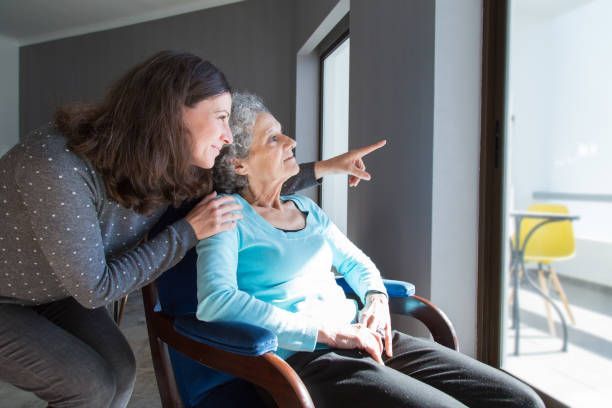
Providing the Same Level
of Care We Expect for
Our Own Family
(516) 408-0034
Dementia Care in NYC: Handling Embarrassing Behaviors in Public
Dementia Care in NYC: 5 Tips on Handling Embarrassing Behaviors in Public
The Alzheimer's Association reports "aggressive behaviors may be verbal or physical. They can occur suddenly, with no apparent reason, or result from a frustrating situation. While aggression can be hard to cope with, understanding that the person with Alzheimer's or dementia is not acting this way on purpose can help. Aggression can be caused by many factors including physical discomfort, environmental factors and poor communication. If the person with Alzheimer's is aggressive, consider what might be contributing to the change in behavior."
Caregivers handling behavior issues at home presents one set of challenges, while handling these same behavior issues in a public environment may be even more challenging and unsettling.

Caring for a loved one with dementia presents unique challenges, particularly when it comes to managing embarrassing behaviors in public settings. Whether it's inappropriate comments, agitation, or confusion, these behaviors can be distressing for both the individual with dementia and their caregivers. At 7 Day Home Care, we understand the complexities of dementia care and are committed to providing specialized support to individuals and families in Manhattan, Queens, Brooklyn, Nassau County, and Suffolk County, New York. In this article, we'll explore practical tips and strategies for caregivers to navigate embarrassing behaviors in public with compassion, dignity, and resilience.
Understanding Dementia and Embarrassing Behaviors:
Dementia is a progressive condition that affects cognitive function, memory, and behavior. Embarrassing behaviors such as wandering, agitation, disinhibition, or verbal outbursts often stem from changes in the brain associated with dementia. It's essential for caregivers to recognize that these behaviors are not deliberate but rather symptomatic of the disease process. By understanding the underlying causes, caregivers can respond to embarrassing behaviors with empathy and patience, maintaining the dignity and respect of their loved ones.
Dementia Care Tip 1: Plan Ahead and Choose Suitable Outings:
Before venturing out in public, it's helpful to plan ahead and choose outings that are conducive to the individual's comfort and well-being. Opt for familiar and low-stress environments, such as quiet parks, familiar restaurants, or sensory-friendly venues. Avoid crowded or overwhelming places that may trigger anxiety or agitation. Additionally, consider the time of day when planning outings, aiming for times when the individual is typically most alert and relaxed.
Dementia Care Tip 2: Use Gentle Redirecting Techniques:
When faced with embarrassing behaviors in public, it's essential to respond calmly and compassionately. Instead of reacting with frustration or embarrassment, use gentle redirecting techniques to guide the individual's focus away from the behavior. Distraction, reassurance, and validation can be effective strategies for redirecting attention and diffusing tense situations. For example, if the individual becomes agitated or starts wandering, gently offer a comforting touch, engage them in a simple activity, or initiate a conversation about a pleasant topic.
Dementia Care Tip 3: Maintain a Positive Attitude and Sense of Humor:
Maintaining a positive attitude and sense of humor can be invaluable tools for navigating embarrassing behaviors in public. Approach situations with patience, flexibility, and a willingness to adapt. Sometimes, laughter can be the best medicine, helping to lighten the mood and reduce tension for both the caregiver and the individual with dementia. Remember to focus on the moments of joy and connection rather than dwelling on the challenges.
Dementia Care Tip 4: Utilize Assistive Devices and Visual Cues:
Assistive devices and visual cues can provide additional support for individuals with dementia when navigating public spaces. Consider using wearable identification bracelets, GPS tracking devices, or personalized cards with essential information such as contact details and emergency instructions. Visual cues, such as signs, pictures, or color-coded cues, can help individuals navigate their surroundings and reduce confusion or anxiety.
Dementia Care Tip 5: Seek Support and Education:
Caring for a loved one with dementia can be emotionally and physically demanding, especially when managing embarrassing behaviors in public. It's essential for caregivers to seek support from family members, friends, support groups, or professional caregivers. 7 Day Home Care offers specialized Alzheimer's and dementia care services, providing caregivers with access to expert guidance, education, and respite care. By sharing experiences and learning from others who understand the challenges of dementia caregiving, caregivers can gain valuable insights and coping strategies.
It's important to note that while the tips and strategies provided in this article can be helpful for managing embarrassing behaviors in public settings for individuals with dementia, they are not a substitute for professional medical advice. If you are a caregiver concerned about the public behaviors of a loved one with dementia, we strongly encourage you to seek guidance from a qualified healthcare professional, such as a physician, geriatrician, or dementia specialist. These professionals can conduct a comprehensive assessment of your loved one's condition, offer personalized recommendations, and provide support tailored to your specific situation. Remember, each individual with dementia is unique, and what works for one person may not necessarily be effective for another. Seeking professional medical help ensures that you receive accurate information and appropriate guidance to address your concerns and provide the best possible care for your loved one.
Caring for a loved one with dementia requires patience, compassion, and resilience, particularly when faced with embarrassing behaviors in public settings. By understanding the underlying causes of these behaviors and implementing practical strategies, caregivers can effectively navigate challenging situations while maintaining the dignity and well-being of their loved ones. At 7 Day Home Care, we are dedicated to supporting individuals and families in Manhattan, Queens, Brooklyn, Nassau County, and Suffolk County, New York, with specialized Alzheimer's and dementia care services. With empathy, education, and a collaborative approach, we empower caregivers to provide the highest quality of care for their loved ones with dementia, both at home and in public settings.
If you are interested in learning more about our specialized Alzheimer's and dementia care services in Manhattan, Queens, Brooklyn, Nassau County, and Suffolk County, New York, please don't hesitate to reach out to us. You can contact us at 516-408-0034 or visit our website 7 Day Home Care for more information. Our dedicated team at 7 Day Home Care is here to support you and your loved ones with compassionate and personalized care that meets your unique needs. We look forward to assisting you on this journey.
Brian Callahan
7 Day Home Care










Hours of Operation
We are Open 24 Hours a Day
7 Days a Week
All Rights Reserved | 7 Day Home Care | Created by DAR Web Consulting